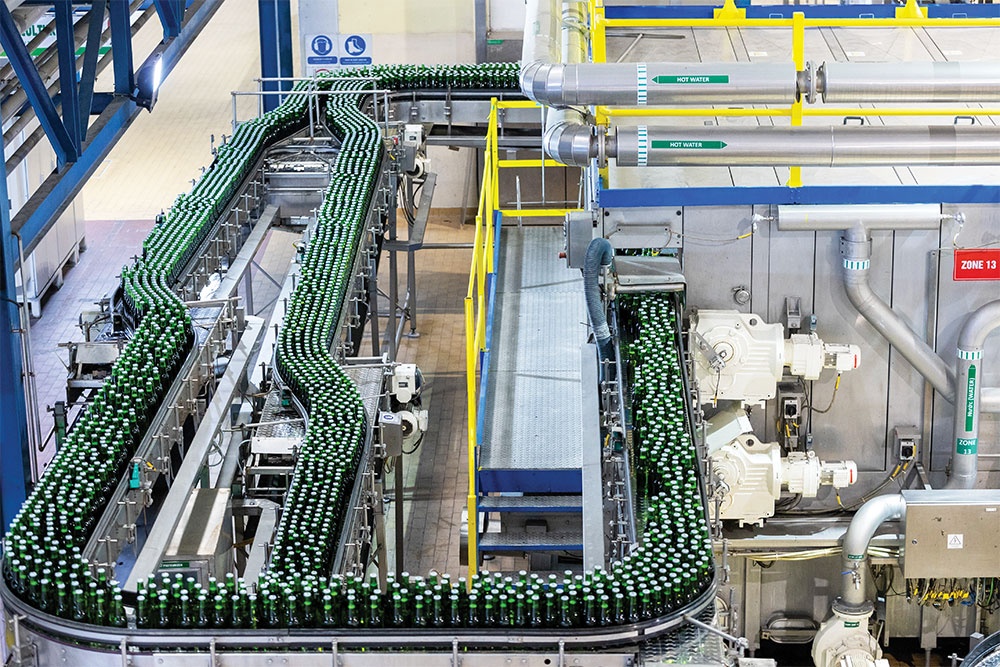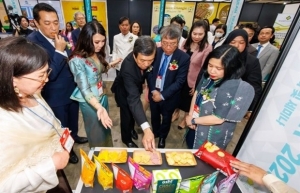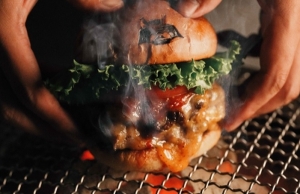F&B prioritising green development moves
 |
| F&B prioritising green development moves |
Highlands Coffee, the coffee and beverage brand with the largest number of stores in Vietnam, last week issued announced plans to start construction of a coffee roasting factory in the southern province of Ba Ria-Vung Tau worth $21 million.
Covering around 24,000sq.m, the factory is expected to become one of the top large-scale coffee roasting factories in Vietnam with a complete capacity of 75,000 tonnes per year.
Besides huge capacity and large capital, one of the reasons why the facility is attracting attention is that it will participate in a sustainability project from the Global Coffee Platform.
The founder of Highlands Coffee, David Thai, said the factory is to be built with the aim to achieving Gold LEED certification for green architecture according to international standards as well as BRC (British Retail Consortium) certification for ensuring food safety in the machinery chain and wastewater treatment in compliance.
Solar energy equipment using Japanese and Swiss technology will also be installed at the factory to minimise costs and reduce the national power grid load.
“With our readiness in terms of investment resources, experience, and operational systems, we will execute this project on schedule, efficiently, and sustainably. We will also establish a training centre and a museum showcasing the history of coffee development in Vietnam and the world,” Thai said.
Highlands Coffee’s transformation has shown that this business has begun to focus on green and sustainable factors and see it as an advantage to stimulate business. “This is also a strategic step for the brand to compete directly with global coffee brands,” Thai added.
Previously, the beverage chain, which owns nearly 680 stores in Vietnam, had been criticised by some consumers for its “half-hearted” green campaigns, specifically in the slowness in converting from plastic straws to paper straws, while continuing to use plastic cups and spoons in stores.
In Vietnam, this sector has also continuously faced difficulties as the consumer demand has decreased since the beginning of this year. More than 40 per cent of businesses recorded a decrease in revenue in the first half of the year, of which more than 60 per cent are large businesses, according to a report on the food and beverage business market by iPOS.vn.
With the market value in 2023 expected to increase by 18 per cent compared to 2022, the food and beverage industry’s demand has recovered strongly in the last months of the year.
Le Quang Kiet, corporate affairs director of HEINEKEN Vietnam, said that environment-related issues were one of the company’s top priorities in the journey towards net-zero.
“We will focus on the energy transition and maximizing circularity in production through the reuse – share - repair model, and water conservation with the ambition of 100 per cent water balance by 2025,” Kiet said.
Innovation and creativity efforts in production have brought HEINEKEN Vietnam closer to its sustainability ambitions. Currently, 96 per cent of the energy used in the company’s six breweries is renewable energy, and the landfilling of waste in production was cancelled in 2021.
This company has also invested $1.3 million in water conservation through forest planting and care activities in key river basins. “We have contributed more than 1 per cent to Vietnam’s total GDP and created 246,000 jobs across the value chain,” said Kiet.
Starbucks is also an example of green transformation. Its campaigns have helped this brand become the most successful foreign beverage brand in the Vietnamese market, and it has opened its 100th store in the country in 10 years.
The company started switching to using straws made from natural ingredients about four years ago and has also changed the lid design of beverage cups from PP to PET, helping customers drink easily without a straw. It is estimated that this change it has helped reduce the use of more than one million plastic straws each year.
CEO of Starbucks Vietnam Patricia Marques said, “We do not do this because of the profits, but consider it a responsibility to contribute to the community. I hope the government will create conditions for businesses to make the transition to sustainable alternative materials, promoting more positive changes in the future.”
 | ASEAN, RoK boost business ties in food, beverage The ASEAN-Korea Centre (AKC) on May 30 opened an ASEAN Trade Fair in the framework of the Seoul Food 2023 (SF2003) to showcase food and beverage products from ASEAN countries and create opportunities for ASEAN companies to connect and establish business partnerships with partners from the Republic of Korea (RoK). |
 | Mixed fortunes persist in F&B arena The food and beverage sector has witnessed fluctuations as local businesses grapple with unprecedented challenges, despite the arrival of some foreign chains. |
 | Exhibitions provide path for F&B ingredients enterprises Vietnamese food and beverage ingredient firms are active in participating in exhibitions to enhance their brand and look for distributors for export. |
What the stars mean:
★ Poor ★ ★ Promising ★★★ Good ★★★★ Very good ★★★★★ Exceptional
Related Contents
Latest News
More News
- State corporations poised to drive 2026 growth (February 03, 2026 | 13:58)
- Why high-tech talent will define Vietnam’s growth (February 02, 2026 | 10:47)
- FMCG resilience amid varying storms (February 02, 2026 | 10:00)
- Customs reforms strengthen business confidence, support trade growth (February 01, 2026 | 08:20)
- Vietnam and US to launch sixth trade negotiation round (January 30, 2026 | 15:19)
- Digital publishing emerges as key growth driver in Vietnam (January 30, 2026 | 10:59)
- EVN signs key contract for Tri An hydropower expansion (January 30, 2026 | 10:57)
- Vietnam to lead trade growth in ASEAN (January 29, 2026 | 15:08)
- Carlsberg Vietnam delivers Lunar New Year support in central region (January 28, 2026 | 17:19)
- TikTok penalised $35,000 in Vietnam for consumer protection violations (January 28, 2026 | 17:15)

 Tag:
Tag:


















 Mobile Version
Mobile Version